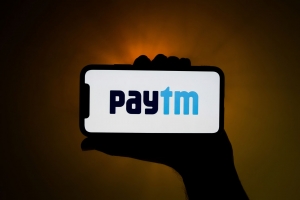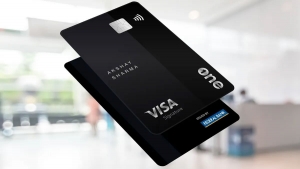India Payments Research
Paytm is in good spirits despite rising losses
Paytm is in high spirits. Its stock has risen 45% over the past three months, making it an outlier among fintechs. Paytm is even feeling pretty good about losing 6.44 billion rupees (US$81 million) in the first quarter of FY2023, an increase of 70% from a loss of 3.8 billion rupees a year earlier. Paytm attributed the higher loss to increased operating costs and said it is on track to reach operating profitability by the second quarter of the fiscal year.
India’s fintech unicorn club has a new member, the credit provider OneCard. In mid-July, OneCard announced it had raised US$100 million in fresh funding at a valuation of US$1.4 billion, nearly double its January valuation of US$750 million. Leading the round was Singapore’s Temasek. Other key participating investors existing backers QED, Sequoia Capital India and Hummingbird Ventures. To date, OneCard has raised US$225 million and says it has over 250,000 customers spending about US$60 million with its cards each month.
India’s UPI is starting to think globally
India’s UPI real-time payments platform has achieved impressive growth since its inception just over six years ago, with expansion being especially turbo-charged during the long coronavirus pandemic. The acceleration of India’s overall digital economy over the past 2.5 years has helped UPI become the most dominant platform of its kind on the subcontinent and even begin nascent international expansion: to the UAE, Bhutan, Singapore, Nepal and now France. The question now is if UPI can build meaningful market share outside of its home country, where it enjoys some inherent advantages.
What goes up, must come down, especially in fintech. We know that buy now, pay later (BNPL) firms have grown organically at a torrid pace in India due to low credit card penetration and strong demand for credit products, and we also know they could not have grown so fast if they had been properly regulated. At the same time, there is a certain systemic financial risk that comes with the possibility of bad consumer debt accruing fast, a likely scenario when BNPL is allowed free rein. With that in mind, the Reserve Bank of India’s (RBI) recent decision to ban nonbanks from loading prepaid instruments (PPI) — digital wallets, or stored-value cards — using credit lines does not come as a big surprise.
Assessing PhonePe’s IPO prospects
Walmart-backed PhonePe is one of the most prominent payment firms in India. It holds the largest share of India’s paramount UPI payments platform of any company, with 47% of the market compared to Google Pay’s 34%. PhonePe says it has 380 million registered users, which means that one in four Indians use its services. The company also serves 30 million offline merchants. With pressure to achieve profitability increasing and investors eager for a successful exit, speculation is mounting about when PhonePe will decide to go public.
India’s UPI is enjoying record-breaking growth
India’s United Payments Interface (UPI) is a bit of an anomaly in the world of fintech, which is typically dominated by high-flying startups and deep-pocketed venture capitalists. UPI was launched in 2016 by a specialized division of the Reserve Bank of India, the National Payments Corporation of India (NPCI), to create a unified real-time payments platform for the subcontinent’s retail payments. Governments are usually not seen as leading fintech innovators, but in this case, UPI has been so successful that other countries are keen to learn from its success; it is expanding internationally and India’s leading e-wallets compete for the largest share of UPI payments.
Will Paytm reach profitability by 2023?
It is important to take what Paytm founder Vijay Shekhar Sharma says with a grain of salt. For many years, he has talked up Paytm’s potential and deep-pocketed backers like SoftBank and Alibaba have bought it. Yet Sharma’s bullishness has not been borne out by Paytm’s stock performance. Though Paytm’s IPO was India’s largest of all time, it nonetheless plummeted on the first day of trading in November 2021 and has since lost about 60% of its value.
Razorpay’s B2B focus is paying off
In December 2021, Razorpay became India’s most valuable private fintech as it reached a valuation of US$7.5 billion, more than double the US$3 billion milestone it hit last April. Razorpay’s US$375 million Series F financing round raised more than all of its previous rounds combined. By eschewing India’s hyper-competitive retail payments market – dominated by the likes of Google Pay and PhonePe, with Paytm a distant third – Razorpay can best capitalize on opportunities in the fast-growing merchant payments segment.
India’s BNPL boom shows no signs of slowing
India’s buy now, pay later (BNPL) market had a cracking 2021 and is charging full speed ahead into 2022. According to RazorPay’s The Covid Era of Rising Fintech report, the India BNPL market grew more than 637% in 2021, even better than 2020’s 569% growth. For its part, India BNPL firm ZestMoney found in a recent survey that BNPL is the top payment option for Indian consumers across all age groups – though most users of the service in subcontinent are ages 23-26. ZestMoney said that its BNPL transactions rose 300% annually in 2021.
Could regulation slow down India’s booming BNPL sector?
India’s buy now, pay later (BNPL) sector is red hot and expected to grow exponentially over the next few years. India is certainly not the first country to experience a BNPL surge and it is tempting to say that we have seen this movie before, and that tough regulation is on the way that will curb BNPL’s growth as in Australia and the UK. But that may not be the case in India given the subcontinent’s low level of credit card penetration and the ability for BNPL to play a genuine financial inclusion role in the economy.
More...
The sky still looks like the limit for UPI in India
United Payments Interface (UPI), the National Payments Corporation of India’s (NPCI) flagship payments platform, had another stellar month in July. According to NPCI data, UPI processed a record 3.24 billion transactions in July, up 15.7% from June, while in terms of value the payments platform processed transactions worth Rs 6.06 trillion, up 10.76% from a month earlier.
India’s remittances market defies pandemic
India’s remittances market was supposed to contract 9% in 2020 per a World Bank forecast. It was a reasonable prediction given the turmoil wrought by the coronavirus pandemic on public health and the global economy. Yet the market was much more resilient than expected. Data from the World Bank show that remittances to India fell just 0.2% in 2020 to US$83 billion.
Who is winning India’s UPI payments race?
The United Payments Interface (UPI) has become a kingmaker in India fintech. The real-time payment system owned by the National Payments Corporation of India (NPCI) has grown exponentially since its inception in 2016, with varying estimates of its overall share of India’s payments market. PwC reckons that UPI could reach a 59% share of Indian digital payments by 2024-25, while Indian tech media site Inc42 says that UPI already has a 73% share of the market, up from just 9% in 2018.
What is the outlook for Revolut in India?
If there is one thing Revolut excels at, it is growth. It would be hard to find another neobank with as many accounts in as many different markets. All that growth is expensive, as seen in the £107 million Revolut lost in FY 2019, which it attributed to a hiring spree. Whether the UK’s most valuable fintech startup is any closer to profitability is an open question. What we do know is that it is eyeing expansion across Asia in 2021-22, with India the first stop.














